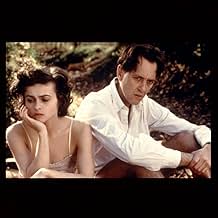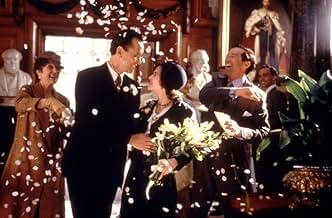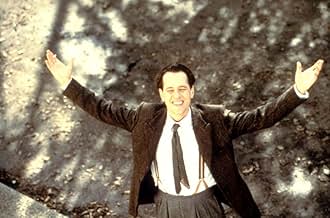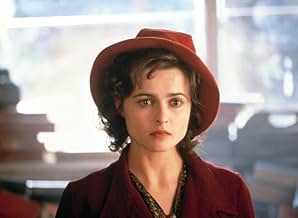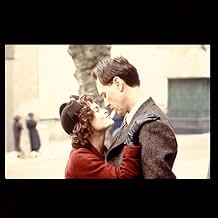CALIFICACIÓN DE IMDb
6.3/10
1.6 k
TU CALIFICACIÓN
Agrega una trama en tu idiomaGordon Comstock quits his job at an advertising agency in order to write poetry, only to find that poets, like everyone else, need money.Gordon Comstock quits his job at an advertising agency in order to write poetry, only to find that poets, like everyone else, need money.Gordon Comstock quits his job at an advertising agency in order to write poetry, only to find that poets, like everyone else, need money.
- Dirección
- Guionistas
- Elenco
- Premios
- 1 premio ganado en total
Barbara Leigh-Hunt
- Mrs. Wisbeach
- (as Barbara Leigh Hunt)
- Dirección
- Guionistas
- Todo el elenco y el equipo
- Producción, taquilla y más en IMDbPro
Opiniones destacadas
In 1930's London, Gordon Comstock (Richard E. Grant) works in the advertising business as a copywriter. His work is so outstanding that he is one of the most valued employees of the firm. Yet Gordon longs to leave the mundane existence of the average worker and become "a poet and a free man". When one of his poems sells for a reasonable sum, he quits his job to devote himself to writing. However Gordon's girlfriend, Rosemary, is aghast. She had hopes for an impending marriage and a comfortable, middle-class life. When writing full-time proves difficult, Gordon sinks lower and lower in terms of places of residence and fiscal circumstances. Yet, he stubbornly pursues his dream, leaving Rosemary in a most unhappy state. Will Gordon come to his senses and return to the stable existence of the work force and the good graces of his lady love?
This is an absolutely delightful movie that is a joy to watch. The main actors are excellent, the cinematography is outstanding, and the costumes and settings lovely to look upon. The script, based on a George Orwell book, is first-rate and engagingly humorous. There is also a level of sophistication that is as pleasing as it is approachable. Finally, there is a satisfying love story that will please any fans of romantic comedies. In short, this is a movie that should appear on lists of recommended films of the highest level. It is truly worthy of much praise.
This is an absolutely delightful movie that is a joy to watch. The main actors are excellent, the cinematography is outstanding, and the costumes and settings lovely to look upon. The script, based on a George Orwell book, is first-rate and engagingly humorous. There is also a level of sophistication that is as pleasing as it is approachable. Finally, there is a satisfying love story that will please any fans of romantic comedies. In short, this is a movie that should appear on lists of recommended films of the highest level. It is truly worthy of much praise.
I went to see the film as I saw parts of it being made. I wanted to see how Woburn Walk could be turned into a road in Hampstead. I liked the film. I wondered why the critics had such a downer on it. Then I read the book and could understand why.
Richard E. Grant was not vicious enough as Comstock and somehow the poverty which Orwell depicted in his book has been cleaned up to the point that you just can't see why Comstock was having so much of a problem. Comstock's arrest has been cleaned up too and the ending was all wrong.
If the film had been released under another name then it would probably have got a smoother ride and only been said to be a pastiche of Orwell's work. If you haven't read the book or seen the film, see the film first.
Richard E. Grant was not vicious enough as Comstock and somehow the poverty which Orwell depicted in his book has been cleaned up to the point that you just can't see why Comstock was having so much of a problem. Comstock's arrest has been cleaned up too and the ending was all wrong.
If the film had been released under another name then it would probably have got a smoother ride and only been said to be a pastiche of Orwell's work. If you haven't read the book or seen the film, see the film first.
Richard Grant is in the advertising business again (this time pre/post WW1) and does a nice job as a conflicted poet versus business man. Helena Bonham Carter reveals a flair for comedy. Very nice settings/photography and wonderful bits by Brit veterans (Liz Smith is particularly amusing) A little slow getting started then it soars.
I loved this film. It's much more cheerful than the book, but what's wrong with that? Artistic license can be a wonderful thing, and those who wanted it to be 1984 should go and watch 1984. When I watch this, I see Gordon Comstock engaged in a futile battle against his own intrinsic middle-classness. He's a pain at times and the film has endowed the character with more humour than he had in the book, probably so that the viewers understand why his friends don't just leave him to stew.
Grant is perfectly cast as Comstock, and keeps him just this side of bearable. Bonham Carter is equally perfect as Rosemary, the long-suffering girlfriend. Add in an excellent supporting cast and there you have it.
The soundtrack's beautiful, except for the song at the end which just shouldn't be there. The settings are stunning, as they rightly should be. All in all, it's a perfect, witty film and one I will never tire of.
Grant is perfectly cast as Comstock, and keeps him just this side of bearable. Bonham Carter is equally perfect as Rosemary, the long-suffering girlfriend. Add in an excellent supporting cast and there you have it.
The soundtrack's beautiful, except for the song at the end which just shouldn't be there. The settings are stunning, as they rightly should be. All in all, it's a perfect, witty film and one I will never tire of.
Gordon Comstock is an aspiring poet and a successful advertising copywriter in 1930s London. He is good at his job and earns a decent middle-class income, but is dissatisfied with what he sees as a materialistic lifestyle and quits the firm to concentrate on writing poetry. He finds, however, that he cannot make a living from poetry alone, is forced to take a much less well-paid job working in a bookshop and spirals down into poverty. About the only thing which saves him from complete destitution is his ability to exploit the generosity of his wealthy publisher Ravelston, of his long-suffering girlfriend Rosemary and of his equally long-suffering sister Julia. And then something happens to shock Comstock out of his nostalgie de la boue.
The film was based on George Orwell's novel of the same name. Orwell's title, playing on the Labour Party anthem "The Red Flag" with its promise to "keep the red flag flying here", refers to the aspidistra, a type of house-plant popular in the late nineteenth century which by the 1930s had become associated with a sort of shabby-genteel lower-middle-class respectability. (Orwell's contemporary H E Bates was to use the symbol of the aspidistra in the same way in his "An Aspidistra in Babylon"). For some reason the film was released in the United States under the meaningless title "A Merry War" which may have misled some viewers into thinking it was a wartime movie. (It isn't; Orwell's book was written before war broke out). About the only "war" involved is Comstock metaphorical war against middle-class values and the worship of the "money-god", and there is little that is merry about this particular conflict.
When I first saw "Keep the Aspidistra Flying" in the cinema in 1997, I enjoyed it a lot more than I did when I watched it again recently. The reason is, almost entirely, that I have now read Orwell's book, something I had not done so in 1997. I can therefore understand some of the criticisms which were made of it at the time. Orwell's social satire is more trenchant than anything which appears in this film, and his depictions of poverty more unsparing than the prettified, sentimentalised version of working-class life which we see here. Orwell's Comstock (who may have been partly a self-portrait) certainly has his perverse, self-destructive side, but we also feel the sincerity, and at least to some extent the justice, of his criticism of middle-class society and its money-worship. In the film, Comstock's protests against materialism never seem anything more than perverse, self-indulgent and quixotic.
It is a pity that the film was not closer in spirit to Orwell's novel, because Richard E. Grant would in many ways have been an ideal choice to play Gordon Comstock as Orwell envisaged him. Indeed, he is not bad in the film which we actually have, but could have been far better in a better film. Other good contributions come from Helena Bonham Carter as Rosemary, sweet and pretty without being too sexy, and from Julian Wadham as Ravelston, a wealthy champagne socialist who tries to assuage his guilty conscience about his wealth by fretting about the plight of the unemployed in Middlesbrough, even though he is not sure where Middlesbrough actually is. (In the novel Ravelston had the first name Philip; here for some reason it is changed to Conrad). Ravelston's girlfriend Hermione also claims to be a socialist, although in her case that claim is somewhat weakened by her insistence that "poor people smell". There are also good cameos from John Clegg as the eccentric Scottish bookshop-owner McKechnie and Barbara Leigh-Hunt as Comstock's landlady Mrs. Wisbeach, the aspidistra-wielding incarnation of everything he dislikes most about the middle classes. Overall, in fact, the film is not a bad one. I just felt it represents a missed opportunity. 7/10
The film was based on George Orwell's novel of the same name. Orwell's title, playing on the Labour Party anthem "The Red Flag" with its promise to "keep the red flag flying here", refers to the aspidistra, a type of house-plant popular in the late nineteenth century which by the 1930s had become associated with a sort of shabby-genteel lower-middle-class respectability. (Orwell's contemporary H E Bates was to use the symbol of the aspidistra in the same way in his "An Aspidistra in Babylon"). For some reason the film was released in the United States under the meaningless title "A Merry War" which may have misled some viewers into thinking it was a wartime movie. (It isn't; Orwell's book was written before war broke out). About the only "war" involved is Comstock metaphorical war against middle-class values and the worship of the "money-god", and there is little that is merry about this particular conflict.
When I first saw "Keep the Aspidistra Flying" in the cinema in 1997, I enjoyed it a lot more than I did when I watched it again recently. The reason is, almost entirely, that I have now read Orwell's book, something I had not done so in 1997. I can therefore understand some of the criticisms which were made of it at the time. Orwell's social satire is more trenchant than anything which appears in this film, and his depictions of poverty more unsparing than the prettified, sentimentalised version of working-class life which we see here. Orwell's Comstock (who may have been partly a self-portrait) certainly has his perverse, self-destructive side, but we also feel the sincerity, and at least to some extent the justice, of his criticism of middle-class society and its money-worship. In the film, Comstock's protests against materialism never seem anything more than perverse, self-indulgent and quixotic.
It is a pity that the film was not closer in spirit to Orwell's novel, because Richard E. Grant would in many ways have been an ideal choice to play Gordon Comstock as Orwell envisaged him. Indeed, he is not bad in the film which we actually have, but could have been far better in a better film. Other good contributions come from Helena Bonham Carter as Rosemary, sweet and pretty without being too sexy, and from Julian Wadham as Ravelston, a wealthy champagne socialist who tries to assuage his guilty conscience about his wealth by fretting about the plight of the unemployed in Middlesbrough, even though he is not sure where Middlesbrough actually is. (In the novel Ravelston had the first name Philip; here for some reason it is changed to Conrad). Ravelston's girlfriend Hermione also claims to be a socialist, although in her case that claim is somewhat weakened by her insistence that "poor people smell". There are also good cameos from John Clegg as the eccentric Scottish bookshop-owner McKechnie and Barbara Leigh-Hunt as Comstock's landlady Mrs. Wisbeach, the aspidistra-wielding incarnation of everything he dislikes most about the middle classes. Overall, in fact, the film is not a bad one. I just felt it represents a missed opportunity. 7/10
¿Sabías que…?
- ErroresDuring a scene in the office, Rosemary is sitting at her desk talking to her boss. The light reflects off her glasses, giving off a green tinge, indicative of anti-reflective lenses - not invented during the time the movie takes place.
- Citas
Rosemary: I will not make love where dogs have peed.
Gordon Comstock: You're so middle-class.
Rosemary: That's not middle-class - that's hygienic.
Selecciones populares
Inicia sesión para calificar y agrega a la lista de videos para obtener recomendaciones personalizadas
- How long is A Merry War?Con tecnología de Alexa
Detalles
- Fecha de lanzamiento
- País de origen
- Sitio oficial
- Idioma
- También se conoce como
- A Merry War
- Locaciones de filmación
- Productoras
- Ver más créditos de la compañía en IMDbPro
Taquilla
- Total en EE. UU. y Canadá
- USD 301,360
- Fin de semana de estreno en EE. UU. y Canadá
- USD 373,830
- 30 ago 1998
- Tiempo de ejecución
- 1h 41min(101 min)
- Mezcla de sonido
- Relación de aspecto
- 1.85 : 1
Contribuir a esta página
Sugiere una edición o agrega el contenido que falta


